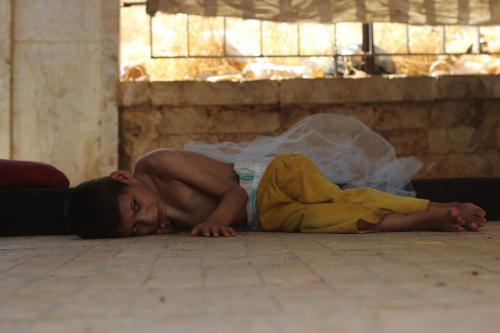Increasingly complex armed conflicts have dire impact on children – UN envoy
The impact on children of the collective failure to prevent and end conflict is severe, with regions in turmoil and violations against children intensifying in a number of conflicts, the senior United Nations envoy on the subject said on Aug 24, stressing that this situation stems directly from an erosion of respect for international humanitarian and human rights law by conflict parties.

On 5 August 2016 in Aleppo, Syria, a child with spinal muscular atrophy who needs special medical care, now lives on the streets, after fleeing with her family from attacks and intense fighting in the 1070 neighbourhood.
In her annual report to the UN General Assembly, the Special Representative of the Secretary-General for Children and Armed Conflict, Leila Zerrougui, highlighted the devastating impact on children of increasingly complex conflicts, despite concerted efforts and significant progress achieved over the past year.
The report, which covers the period from August 2015 to July 2016, notes that the proliferation of actors involved in armed conflict and cross-border aerial operations created highly complex environments for the protection of boys and girls.
A news release on the report explains that in 2015, and again in the first half of 2016, Afghanistan recorded the highest number of child deaths and injuries since the UN started systematically documenting civilian casualties in 2009. In addition, in Syria and Iraq, violence continued unabated.
And in South Sudan, following a year during which children were victims of brutal violations, hopes for improvement “all but evaporated” with the resumption of conflict last month. In Yemen, the escalation of conflict continued with alarming levels of child recruitment, killing and maiming and attacks on schools and hospitals.
The current report also marks the twentieth anniversary of ‘children in armed conflict’ mandate, and takes stock of the achievements accomplished since the publication of Graça Machel’s A ground-breaking report, “Impact of armed conflict on children,” which led to the creation of the mandate of the Special Representative by the General Assembly.
Since 2000, over 115,000 children have been released as a result of action plans and advocacy. Engagement with non-State armed groups is growing and recently contributed to a historic agreement between the Government of Colombia and the FARC-EP to release all children in the ranks of the FARC-EP.
The advocacy generated by this mandate, and reinforced by the campaign Children, not Soldiers, has led to a global consensus among UN Member States that children do not belong in security forces in conflict. This progress in addressing recruitment and use over the last 20 years has been built upon and utilized in work to reduce other grave violations, notably sexual violence and attacks on schools and hospitals.
Yet, the report cites complex and emerging issues needing particular attention, including protection challenges posed by violent extremism, attacks on health case and protected persons, and displacement, specifically noting that armed conflict has resulted not only in human casualties, but also in an ever growing number of displaced children.
Indeed, according to the UN refugee agency, an unprecedented 65.3 million people around the world have been forced away from their homes among them are nearly 21.3 million refugees, over half of whom are children. As such, Ms. Zerrougui encourages Member States and other partners to support initiatives to help displaced children rebuild their lives, particularly through ensuring that education is prioritised in emergency settings.
Among the key recommendations to the General Assembly and Member States that warp up the report are:
● To ensure that Member States engagement in hostilities, including in efforts to counter violent extremism, are conducted in full compliance with international humanitarian, human rights and refugee law;
● To highlight the rights of children displaced by conflict and the obligations of States of origin, transit and destination;
● To treat children allegedly associated with non-State armed groups as victims entitled to the full protection of their human rights;
● Encouraging Member States concerned by the “Children, not Soldiers” campaign to redouble their efforts to fully implement their Action Plan;
● To take appropriate measures to reintegrate children, giving special attention to the needs of girls; and
● To ensure that special attention is paid to children affected by armed conflict in the implementation of the Sustainable Development Goals.
Source: United Nations
- 315 reads
Human Rights
Fostering a More Humane World: The 28th Eurasian Economic Summi

Conscience, Hope, and Action: Keys to Global Peace and Sustainability

Ringing FOWPAL’s Peace Bell for the World:Nobel Peace Prize Laureates’ Visions and Actions

Protecting the World’s Cultural Diversity for a Sustainable Future

Puppet Show I International Friendship Day 2020

